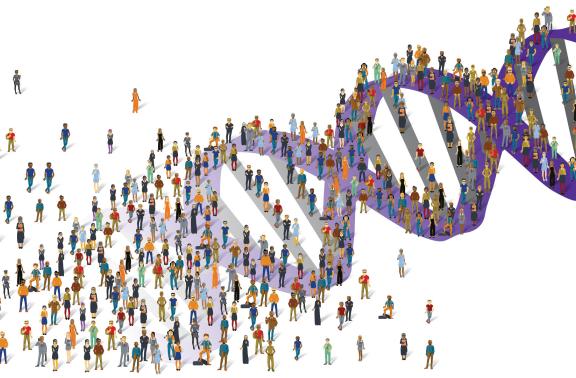ELSIhub Resources for Educators
ELSIhub strives to provide our audience with scholarship, educational content, webinars, community news, and resources focused on the ethical, legal, and social implications (ELSI) of genetics and genomics. Below is a compilation of resources that are of particular relevance to educators.
If you use any of these resources, please acknowledge the source and/or credit its author using the instructions provided below.
Curricula, Syllabi, and Case Studies
Browse ELSIhub for different teaching materials, such as curricula, syllabi and case studies. Listed below are examples of a few resources:
- Fred Hutch Cancer Center. (n.d.). Race, racism, and genetics [Online curriculum]. These 8 lesson plans for high school teachers were developed by the Science Education Partnership at the Fred Hutch Cancer Center. They are adapted for remote learning and examine race as a social and political construct influenced and reinforced by bias and structural racism.
- Dasgupta, S. (2017). Medical genetics ethics case collection: Discussion materials for medical students in the genomic era. MedEdPORTAL, 13, Article 10562. This collection of cases in medical genetics, focuses on ethical dimensions of genetic testing. This case collection was developed for first-year medical students and spans topics such as direct-to-consumer genetic testing, patient privacy, economic and legal issues associated with genetic testing, and secondary findings in whole exome/genome sequencing.
- Patel, R. A., Ungar, R. A., Pyke, A. L., Adimoelja, A., Chakraborty, M., Cotter, D. J., Freund, M., Goddard, P., Gomez-Stafford, J., Greenwald, E., Higgs, E., Hunter, N., MacKenzie, T. M. G., Narain, A., Gjorgjieva, T., & Martschenko, D. O. (2024) Introduction to genetics, ethics, and society [Syllabus]. A trainee-led team affiliated with the Stanford University Genetics Department developed this course on genetics, ethics and society.
The full set of ELSI syllabi are available here. CERA recommends that anyone who utilizes the syllabi include acknowledgment language in their own syllabi to credit the author. Below are sample acknowledgement statements that can be applied to your syllabus when you have used a portion of material or concepts from a syllabus created by another instructor.
Acknowledgement: In the creation of this syllabus, I have adapted portions of the Introduction to Genetics, Ethics, and Society syllabus developed by Roshni Patel and colleagues.
The following acknowledgements statement is from Jeremy Price's Learning Communities in the Digital Age syllabus:
Acknowledgements: I have adapted the ideas and language from the work of several educators for this syllabus, and I appreciate their contributions to this syllabus. The language concerning Universal Learning is courtesy of the "Accessibility Statements on Syllabuses" on the ProfHacker blog (http://bit.ly/1bAXeDN). The language concerning the respective responsibilities of professor and students is courtesy of Dr. Terry Murray of the State University of New York at New Paltz. Language concerning definitions of Teaching for Understanding terms is from the Harvard Graduate School of Education Active Learning Practice for Schools website (http://learnweb.harvard.edu/alps/tfu/). The Unit Maps are based on the graphic organizer in the Teaching for Understanding Guide by Tina Blythe and Associates. All comics panels are from Rhymes with Orange by Hilary Price (http://rhymeswithorange.com).
SNAPSHOTs
pgEd SNAPSHOTs are short distance-learning modules created by the Personal Genetics Education Project (pgEd). Students can work through SNAPSHOTs in a self-directed manner, in 15-20 minutes. Listed below are a few examples of SNAPSHOT topics:
- Introduction to Genetics and Medicine
- ACTN3: Can Genetics Tell Me if I am Going to be an Olympic Sprinter?
- Ancestry and Identity in the Genomic Age
Please refer to the pgEd copyright policy statement when using these materials.
Videos
CERA records and archives our seminars and conferences on ELSIhub. Please find videos and related resources of particular interest to educators below.
- ELSIconversations: Exploring Difference in the Biology Classroom: What Genetic Ancestry Tests Mean (and What They Don't). [Related resources]
- ELSIconversations: Exploring Difference in the Biology Classroom: Engaging with Genetic Disability and Difference. [Related resources]
- ELSIconversations: Exploring Difference in the Biology Classroom: How to represent wide-ranging family structures and personal identities using the latest pedigree nomenclature. [Related resources]
- ELSI Friday Forum: Wrestling with Social and Behavioral Genomics. [Related resources]
- ELSI Friday Forum: Ethical Challenges in Novel Gene Therapies for Sickle Cell Disease. [Related resources]
- ELSIcon2022: The Fallacy of Biological Race: Systemic Racism in Genomics
- ELSIcon2022: Ableism, Audism, Ethics, and Genetics: A Just and Equitable Deaf Future?
- ELSIcon2022: Troubled Dreams: Genetics, Race, and the Search for Justice in Sickle Cell Disease
All recordings of ELSIhub events can be accessed in the ELSIhub video archive. Please refer to the suggested citation at the bottom of each video description when referencing ELSIhub video recordings.
ELSIhub Collections
ELSIhub Collections are essential reading lists on fundamental or emerging topics in ELSI, curated and explained by expert Collection Editors, often paired with ELSI trainees. This series assembles materials from cross-disciplinary literatures to enable quick access to key information. Listed below are three collections that may be of interest to educators:
- Genomics of Education in Education: ELSI Concerns about Genomic Prediction in Educational Settings
- Neurobehavioral Genetic Testing in Children: How Much Should We Know?
- Race, Genetics, and Genetics Education
The full set of collections are available on the ELSIhub Collections page under the resources section. Please refer to the suggested citation at the bottom of each page when referencing an ELSIhub collection.
Please reach out to [email protected] if you would like to share a resource that is not listed above!


